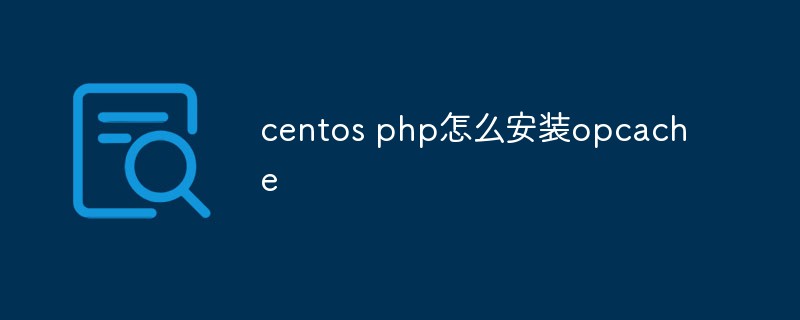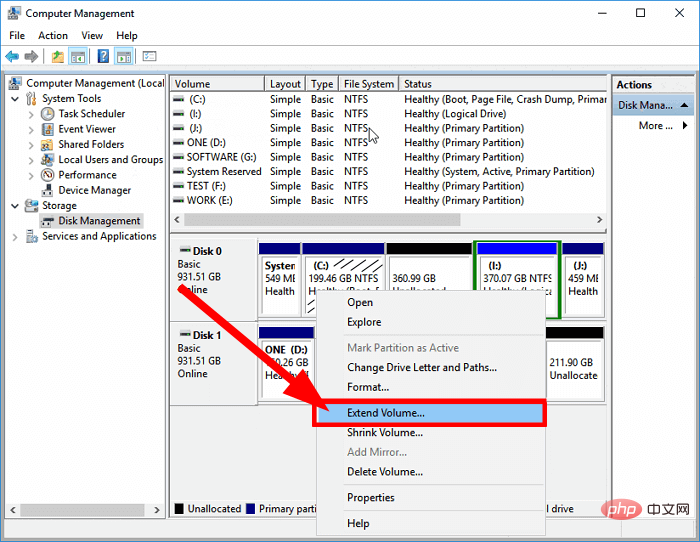How to install redis php extension in centos: first download and install redis through "make install"; then start the redis service and modify the "redis.conf" file; then download and install php through relevant commands; finally restart "php -fpm" service.

##CentOS7 Install Redis and PHP-redis extension
daemonize yesRedis is A key-value storage system, which belongs to what we often call NoSQL. It complies with the BSD protocol, supports the network, can be memory-based and persistent log-type, Key-Value database, and provides APIs in multiple languages. It is commonly used in scenarios such as caching, queues, Pub/Sub, counting statistics, rankings, voting and sorting. This article introduces how to install redis on CentOS7 and the php-redis extension library that allows PHP to support redis.
Install Redis
Redis official download address: http://redis.io/download, download the latest stable version. The current stable version is 4.0.9, download and install:$ wget http://download.redis.io/releases/redis-4.0.9.tar.gz $ tar -zxvf redis-4.0.9.tar.gz $ mv redis-4.0.9 /usr/local/redis $ cd /usr/local/redis $ make $ make installAfter make is completed, the compiled redis service program redis-server will appear in the redis-4.0.9 directory. There is a client program redis-cli for testing. The two programs are located in the src directory of the installation directory: Start redis service
$ cd src $ ./redis-serverNote that starting redis in this way uses the default configuration. You can also tell redis to use the specified configuration file through startup parameters and use the following command to start.
$ cd src $ ./redis-server redis.confredis.conf is a default configuration file. We can use our own configuration files if needed. After starting the redis service process, you can use the test client program redis-cli to interact with the redis service. For example:
[root@localhost src]$ ./redis-cli 127.0.0.1:6379> ping PONGNext modify redis.conf, set the password and background running mode.
$ vim /usr/local/redis/redis.confRemove the comment in front of
requirepass foobaredand change it to your password, such as
requirepass 123456Change
daemonize yesto
daemonize yesSave it. Configure redis service management script:
$ cp /usr/local/redis/utils/redis_init_script /etc/init.d/redisModify redis, vim /etc/init.d/redis
CONF="/usr/local/redis/redis.conf"Start redis service
$ /etc/init.d/redis start Starting Redis server... 12797:C 30 May 22:53:34.030 # oO0OoO0OoO0Oo Redis is starting oO0OoO0OoO0Oo 12797:C 30 May 22:53:34.030 # Redis version=4.0.9, bits=64, commit=00000000, modified=0, pid=12797, just started 12797:C 30 May 22:53:34.031 # Configuration loadedAt this time You can see that the redis service is up and occupies port 6739 by default. Install PHP redis extensionBefore starting to use Redis in PHP, we need to ensure that the redis service has been installed and that PHP can be used normally on your machine. Next, let us install the PHP redis driver. The download address is: https://github.com/phpredis/phpredis/releases. Download and install the latest version:
$ wget https://github.com/phpredis/phpredis/archive/4.0.2.tar.gz $ tar -zxvf phpredis-4.0.2.tar.gz $ cd phpredis-4.0.2 $ /usr/local/php/bin/phpize # php安装后的路径 $ ./configure --with-php-config=/usr/local/php/bin/php-config $ make && make installAdd redis.so to php.ini
$ echo 'extension=redis.so' >> /usr/local/php/etc/php.iniRestart the php-fpm service
$ /etc/init.d/php-fpm restartView redis Whether the extension is installed successfully
$ php -m | grep redis redisTest:
<?php
//连接本地的 Redis 服务
$redis = new Redis();
$redis->connect('127.0.0.1', 6379);
$redis->auth('123456');
echo "Connection to server sucessfully";
//查看服务是否运行
echo "Server is running: " . $redis->ping();Currently, the PHP version installed in my system is 7.2. Experiments have proved that PHP7.2 already supports Redis. If you execute phpize, you will get an error: Cannot find autoconf. Please check your autoconf installation and the $PHP_AUTOCONF environment variable. Then, rerun this script.Solution: Installation Depends on autoconf$ yum -y install autoconf
The above is the detailed content of How to install redis php extension on centos. For more information, please follow other related articles on the PHP Chinese website!
 centos用什么命令可查版本号Mar 03, 2022 pm 06:10 PM
centos用什么命令可查版本号Mar 03, 2022 pm 06:10 PM查版本号的命令:1、“cat /etc/issue”或“cat /etc/redhat-release”,可输出centos版本号;2、“cat /proc/version”、“uname -a”或“uname -r”,可输出内核版本号。
 centos重启网卡的方法是什么Feb 22, 2023 pm 04:00 PM
centos重启网卡的方法是什么Feb 22, 2023 pm 04:00 PMcentos重启网卡的方法:1、对于centos6的网卡重启命令是“service network restart”;2、对于centos7的网卡重启命令是“systemctl restart network”。
 centos php怎么安装opcacheJan 19, 2023 am 09:50 AM
centos php怎么安装opcacheJan 19, 2023 am 09:50 AMcentos php安装opcache的方法:1、执行“yum list php73* | grep opcache”命令;2、通过“yum install php73-php-opcache.x86_64”安装opcache;3、使用“find / -name opcache.so”查找“opcache.so”的位置并将其移动到php的扩展目录即可。
 centos 怎么离线安装 mysqlFeb 15, 2023 am 09:56 AM
centos 怎么离线安装 mysqlFeb 15, 2023 am 09:56 AMcentos离线安装mysql的方法:1、将lib中的所有依赖上传到linux中,并用yum命令进行安装;2、解压MySQL并把文件复制到想要安装的目录;3、修改my.cnf配置文件;4、复制启动脚本到资源目录并修改启动脚本;5、将mysqld服务加入到系统服务里面;6、将mysql客户端配置到环境变量中,并使配置生效即可。
 centos 7安装不出现界面怎么办Jan 03, 2023 pm 05:33 PM
centos 7安装不出现界面怎么办Jan 03, 2023 pm 05:33 PMcentos7安装不出现界面的解决办法:1、选择“Install CentOS 7”,按“e”进入启动引导界面;2、 将“inst.stage2=hd:LABEL=CentOS\x207\x20x86_64”改为“linux dd”;3、重新进入“Install CentOS 7”,按“e”将“hd:”后的字符替换成“/dev/sdd4”,然后按“Ctrl+x”执行即可。
 centos 怎么删除 phpFeb 24, 2021 am 09:15 AM
centos 怎么删除 phpFeb 24, 2021 am 09:15 AMcentos删除php的方法:1、通过“#rpm -qa|grep php”命令查看全部php软件包;2、通过“rpm -e”命令卸载相应的依赖项;3、重新使用“php -v”命令查看版本信息即可。
 centos中ls命令不显示颜色怎么办Apr 20, 2022 pm 03:16 PM
centos中ls命令不显示颜色怎么办Apr 20, 2022 pm 03:16 PM方法:1、利用“vim ~/.bashrc”编辑用户目录(~)下的“.bashrc”文件;2、在文件内添加“alias ls="ls --color"”;3、利用“:wq!”命令保存文件内的更改;4、“exit”命令退出终端后重新连接即可。
 如何在 CentOS 9 Stream 上安装 NagiosMay 10, 2023 pm 07:58 PM
如何在 CentOS 9 Stream 上安装 NagiosMay 10, 2023 pm 07:58 PM我们的PC中有一个磁盘驱动器专门用于所有与Windows操作系统相关的安装。该驱动器通常是C驱动器。如果您还在PC的C盘上安装了最新的Windows11操作系统,那么所有系统更新(很可能是您安装的所有软件)都会将其所有文件存储在C盘中。因此,保持此驱动器没有垃圾文件并在C驱动器中拥有足够的存储空间变得非常重要,因为该驱动器拥有的空间越多,您的Windows11操作系统运行起来就越顺畅。但是您可以在磁盘驱动器上增加多少空间以及可以删除多少文件是有限制的。在这种情况下,


Hot AI Tools

Undresser.AI Undress
AI-powered app for creating realistic nude photos

AI Clothes Remover
Online AI tool for removing clothes from photos.

Undress AI Tool
Undress images for free

Clothoff.io
AI clothes remover

AI Hentai Generator
Generate AI Hentai for free.

Hot Article

Hot Tools

EditPlus Chinese cracked version
Small size, syntax highlighting, does not support code prompt function

Safe Exam Browser
Safe Exam Browser is a secure browser environment for taking online exams securely. This software turns any computer into a secure workstation. It controls access to any utility and prevents students from using unauthorized resources.

Dreamweaver CS6
Visual web development tools

SublimeText3 Linux new version
SublimeText3 Linux latest version

mPDF
mPDF is a PHP library that can generate PDF files from UTF-8 encoded HTML. The original author, Ian Back, wrote mPDF to output PDF files "on the fly" from his website and handle different languages. It is slower than original scripts like HTML2FPDF and produces larger files when using Unicode fonts, but supports CSS styles etc. and has a lot of enhancements. Supports almost all languages, including RTL (Arabic and Hebrew) and CJK (Chinese, Japanese and Korean). Supports nested block-level elements (such as P, DIV),






